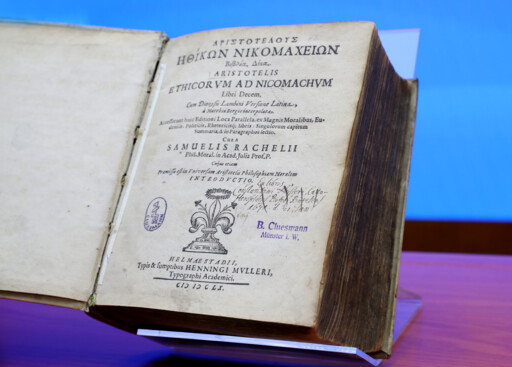


‘Wisdom of classical civilizations offers timeless lessons’

The Nicomachean Ethics, authored by Aristotle and printed in the 17th century, on diaplay during the inaugural World Conference of Classics Photo: Zhu Gaolei/CSST
As profound changes unfold globally, humanity is again at a crossroads of history, facing a wide range of challenges, such as the backlash against globalization, rising nationalism, and climate change. Crystallizing human wisdom, classics contain rich historical information and cultural value. These intellectual legacies are expected to provide solutions to common problems of humanity and enhance mutual understanding and trust between civilizations.
During the inaugural World Conference of Classics, CSST interviewed John Baines, a professor emeritus of Egyptology at the University of Oxford and a fellow of the British Academy in the United Kingdom, and Dr. Lina Mendoni, minister of culture of Greece, who offered insights into the modern world and the contemporary relevance of classical traditions.
Increasingly diverse world
Baines noted that the world is growing increasingly diverse, with populations becoming increasingly less culturally homogeneous. “For example, Islamic people have their own heritage; they will look back to the prophet or the pre-Islamic world. Islam often gets demonized. Overall, Islam makes people tend to be more benevolent than non-Islamic people within our societies.”
“So, perhaps what is more desirable is for people to accept that there is a diversity of heritages, all of which can be useful, and the positive aspects can be respected. This is the same for African traditions, which are also very interesting and important,” Baines said.
Common themes
Regarding common themes that both China and Western nations, such as Greece, focus on in their studies of classical civilizations, Baines emphasized that a central concern is the coherence of societies. “We mainly know about the elites and not about society as a whole. However, in a place like Egypt, which is my specialty, the idea that the elites have a duty towards the rest of society is very clear,” he said. “Values of this sort can also be seen in what I’ve read about ancient China.”
“Some issues go back to really early times, and those are much more difficult to trace. It’s almost as if, in order for civilizations to form, they go through periods of great change and a lot of cruelty,”Baines continued.
“So, I think you develop these general ethical principles which you can find in many civilizations, and they’re probably quite similar everywhere. But you have to accept that all you can really access is the culture of the elites. And that will be just as true for China as it is for ancient Egypt,” he asserted.
“Greece is a little different; you get a bit more insight into society, but in the classic case, such as classical Athens, women, people not born in Athens, and slaves had no voice,” Baines said. “Ethics is the thing you can really pick up on that occurs across many different societies. Of course, it also occurs in small-scale societies throughout the world.”
Comparing Chinese, Greek ideals
In Mendoni’s view, classical ideals such as reason, freedom, and civic responsibility remain central to public life in Greece, forming the foundation of legal systems, educational frameworks, and democratic institutions. On the other hand, Chinese philosophy emphasizes harmony, balance, and the cultivation of virtue—values that continue to resonate in modern governance, societal structures, and personal relationships, and communicate with classical ideals.
“As we stand at the crossroads of history, facing unprecedented global challenges—such as climate change, geopolitical tensions, social inequality, and technological disruptions—the wisdom of classical civilizations offers timeless lessons,” Mendoni articulated.
“In particular, the Greek concept of metron, or moderation, holds profound significance. Rooted in ancient Greek philosophy, this ideal emphasizes the importance of balance in both personal and societal life,” she explained. “Similarly, Confucius’ teachings on moral governance and the cultivation of virtue highlight the importance of ethical responsibility, not only at the individual level but also within the structures of power and authority.”
“In today’s world, where corruption, inequality, and political polarization threaten the social fabric, Confucius’ vision of a just and virtuous society offers a powerful framework for addressing these challenges. His emphasis on the role of leaders as moral exemplars resonates deeply with contemporary debates on governance, integrity, and public service,” Mendoni added.
Editor:Yu Hui
Copyright©2023 CSSN All Rights Reserved